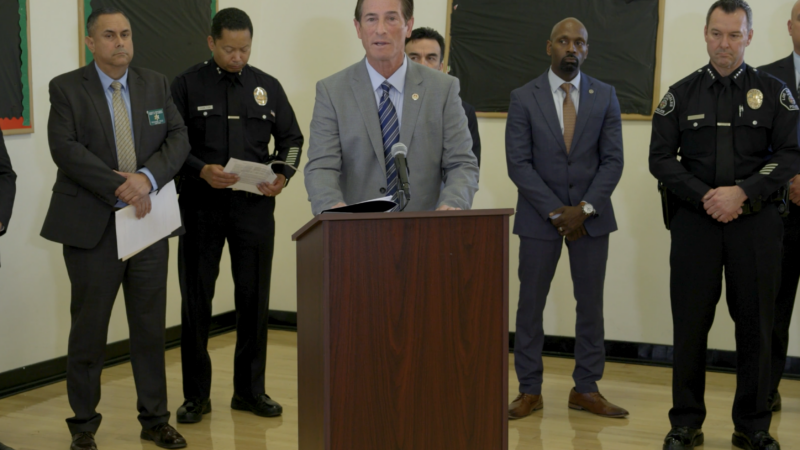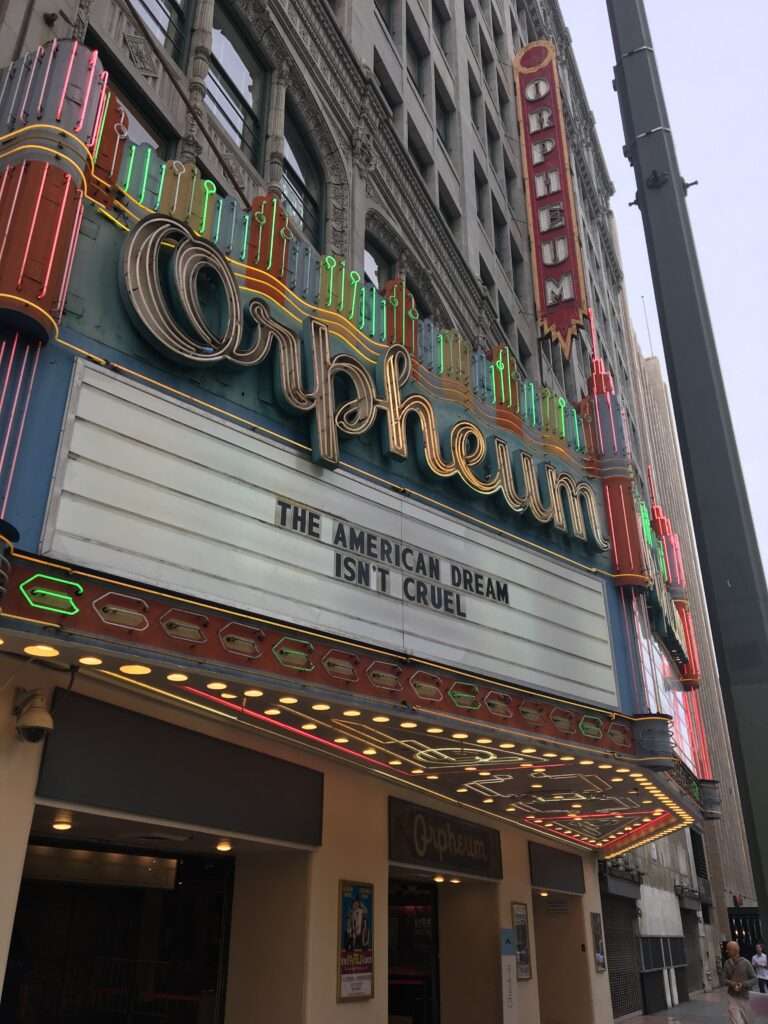'Human Trafficking' Sting Yields 547 Arrests, but Only 1 for Human Trafficking
A(nother) look at how human trafficking panic gets made.

"Weeklong human trafficking sting operation nets 547 arrests across California," says the KTLA5 headline. With "Operation Reclaim & Rebuild," over 100 law enforcement agencies set out "rescuing victims of sexual slavery and human trafficking, apprehending their captors and disrupting the demand for vulnerable individuals," the Los Angeles news station reports.
To your casual observer, that surely suggests that hundreds of traffickers were arrested during the operation, which took place from January 26 through February 1. And with a few careful language tricks, police are happy to stoke this impression. Indeed, some 333 of those arrested were "exploiters," the Los Angeles Police Department (LAPD) brags.
But dig a little deeper and it becomes clear that this whole operation is a mirage, designed to give the impression that police are playing heroes instead of consensual sex cops.
You are reading Sex & Tech, from Elizabeth Nolan Brown. Get more of Elizabeth's sex, tech, bodily autonomy, law, and online culture coverage.
If only 333 of the arrests involved "exploiters," that means a full 214 arrests were for unrelated charges. The LAPD doesn't say for what, but it could mean that women were also arrested for prostitution, as is often the case in so-called human trafficking stings. Such stings also tend to be used as catchall petty-crime dragnets, picking up people for things like drug possession, driving on an expired license, owning a gun without the right permits, or having outstanding warrants.
Still, 333 "exploiters" would be a lot—if the term here actually meant people guilty of sexual exploitation. But law enforcement now tends to lump prostitution customers in with sex traffickers, counting any attempt to pay a consenting adult for sex as exploitation. It's very likely that the vast majority of these "exploiters" merely face a solicitation charge.
This assumption is backed up by information from the Los Angeles District Attorney's Office, which reports that only one person was charged with trafficking of a minor for a commercial sex act.
Three additional people were charged with "pandering"—that is, facilitating prostitution—and one person was charged with pimping, according to the D.A.'s office.
So with 547 arrests in this "human trafficking sting," we get one—one!—human trafficking charge?
The D.A.'s office suggests more charges could come eventually. But cops always say that. It's a convenient way to put off people who might question the premises of their sting. Sure, sure, only one charge now, but there could be more coming later! Ask again later, and you'll get no response or a promise that the investigation is still ongoing. I've followed up on enough of these stings to know the playbook well.
It's not even clear that the one human trafficking arrest here had anything to do with this massive sting operation, as the arrest took place three days before Operation Reclaim and Rebuild supposedly started.
And the deceptive descriptions of those arrested aren't the only language used to obscure what's really happening. Police also trumpet the rescue of 166 adult and 11 minor victims. The adults were offered support, say police. No further details.
This is also part of the playbook: Be incredibly vague about what happened. Claim huge numbers of potential victims that are conveniently never heard of again.
The truth is that cops count anyone they find selling sex as a victim. Sometimes they say that outright, but even when they don't, the proof is in the (lack of) arrests. The fact that few, if any, trafficking charges are ever brought stands as a testament to the fact that sex workers are being counted as "rescued" victims, even if the only rescue involves handcuffing them, questioning them, and giving them the phone number of some local social services group.
This was the 11th year of Operation Reclaim and Rebuild, according to Los Angeles County District Attorney Nathan J. Hochman.
This year's stings were conducted by a human trafficking task force that included the FBI, Homeland Security Investigations, and the U.S. Attorney's Office—which means federal funds aimed at fighting trafficking were definitely used, as they so often are.
If President Donald Trump and Elon Musk are truly looking for places to cut government spending, they could start with all the federal funds going to policing prostitution and arresting adults who try to engage in consenting, if commercial, sex with another adult.
But they won't, because these sorts of stings prove incredibly useful for all sorts of political purposes. Under the last Trump administration, there seemed to be an uptick in prostitution stings aimed at Asian massage parlors, which are often owned and staffed by immigrants. Women faced deportation for giving illegal handjobs. Fighting "human trafficking" became just another way to crack down on immigrants.
I suspect we'll see something similar during this Trump term, with prostitution stings used as both a means of finding undocumented immigrants and ratcheting up "sex trafficking" numbers in order to justify more policing of immigrant communities.
Targeting massage parlors was, of course, part of Operation Reclaim and Rebuild. No human trafficking arrests were made, but five massage businesses were shut down for "code violations" and several others received administrative citations.
The bottom line is that we don't need to arrest hundreds of people on prostitution charges in order to find victims or arrest perpetrators of human trafficking. But authorities—from local police to the FBI and Homeland Security—know they won't get the same amount of attention, approval, or money if they simply call these sex stings, petty-crime dragnets, and witch hunts what they are.
More Sex & Tech News
• OnlyFans investigation is dropped by U.K. communications office Ofcom. "After months of fevered headlines about an 'investigation' into OnlyFans supposedly allowing access to minors—Ofcom has quietly announced that they've closed the investigation, with no findings," notes Free Speech Coalition Public Policy Director Mike Stabile.
• Securities and Exchange Commission (SEC) scaling back anticryptocurrency actions? The SEC will "scale back a special unit of more than 50 lawyers and staff members that had been dedicated to bringing crypto enforcement actions," The New York Times reports:
The move is one of the first concrete steps by President Trump and his administration to pull back on the regulation of cryptocurrencies and other digital assets. One of Mr. Trump's first executive orders was aimed at promoting the growth of crypto and "eliminating regulatory overreach" on digital assets.
Some of the lawyers in the crypto unit are being assigned to other departments in the S.E.C., the people said. One of the unit's top lawyers was moved out of the enforcement division. Some of the people briefed on the shake-up described that move as an unfair demotion.
A spokesperson for the S.E.C. declined to comment.
• Tech trade group NetChoice is suing over Maryland's Age-Appropriate Design Code Act, which includes a requirement that tech platforms report to regulators about how their services could impact minors. This essentially requires companies "to disparage their services and opine on far-ranging and ill-defined harms that could purportedly arise from their services' 'design' and use of information," according to NetChoice.
• Judge halts Trump trans order: A federal judge has temporarily blocked the Trump administration from implementing parts of a January 20 executive order that would "block trans women from women's prisons, and … prohibit [imprisoned] trans people from receiving gender-affirming medical care," Chris Geidner reports.
• Google shifts AI ethics policy: "Google on Tuesday updated its ethical guidelines around artificial intelligence, removing commitments not to apply the technology to weapons or surveillance," notes The Washington Post.
Today's Image



Show Comments (35)